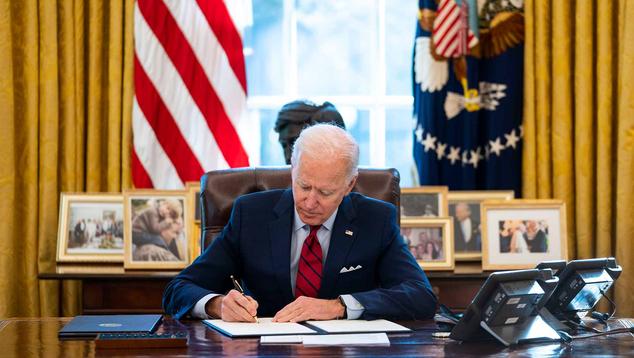This is one in a series of articles looking at the issues being tackled by the new Biden administration, from the perspective of the average American. Our focus here is immigration, one of the central themes of Donald Trump's presidential campaign in 2016 and the focus of high-profile policy actions taken throughout his four years in office. Within hours of Joe Biden's inauguration, however, the newly elected president began the process of reversing a number of those policies with executive orders of his own.
Interestingly, despite Biden's focus on immigration, the data make it clear that the issue of immigration is no longer nearly as top of mind for Americans as it has been at other times in recent history. My colleague Jeff Jones did an excellent job in July 2019 reviewing the data which at that point showed a record-high 27% of Americans mentioning immigration as the nation's most important problem. This was only the fourth time in Gallup history that immigration topped the list, propelled to the forefront of public consciousness that year by concerns over reports of large numbers of refugees moving up from Central America toward the U.S.
Now, almost no Americans think first of immigration when asked to name the nation's top problem, reflecting the overriding impact of the pandemic, problems with the nation's governance in this time of transition and the pending second impeachment trial of Donald Trump. This is a continuation of what we have seen now for a number of months; only 1% or 2% of Americans have mentioned immigration as the top problem since last April. I don't think this means immigration has ceased to be a concern for the average American, but rather that it is an issue whose salience waxes and wanes depending on how much it is in the news and on how much other issues dominate the news landscape.
Clearly, the issue is in a "wane" phase at this point, even when Americans are asked about it explicitly. Pew Research recently rated the importance of immigration policy as part of a list of concerns, with immigration coming in 14th out of the 19 issues tested in terms of Americans saying it should be a top priority for the president and Congress to address this year -- so designated by just 39% of Americans. That is far below the 80% and 78% priority ratings given to strengthening the economy and dealing with the coronavirus situation, respectively.
Nevertheless, despite immigration's lack of status as a front-burner issue for Americans, Biden has moved ahead with rapidity in operationalizing his plans to countermand Trump's immigration-related policies. So far, most of what Biden has done seems to fit well with majority public opinion, highlighting the evident fact that much of what Trump did in relationship to immigration -- while appealing to parts of his political base -- was out of sync with the attitudes of the average American.
The Border Wall. Biden, on the day he was inaugurated, ordered a pause in border wall construction, rescinding the national emergency declaration Trump used to divert billions from the Department of Defense for the wall's construction. Biden has ordered a review to decide what to do going forward relating to barriers along the nation's border with Mexico. This came just days after Trump himself made a gesture of support for his wall project, taking his last official trip as president (except for his final flight to Florida on Jan. 20) to the Texas-Mexico border to applaud and reinforce the wall's construction. American public opinion is clearly on Biden's side on this issue; Gallup and a wide variety of surveys done by other organizations have consistently shown opposition to building the wall.
Muslim Travel Ban. Biden also quickly issued a proclamation revoking the ban on travelers from several majority-Muslim countries, put in place by Trump as one of his first official actions four years earlier. Again, Biden ordered a review to determine what should come next in terms of adjusting the country's visa policies. There hasn't been a lot of public opinion surveying about the ban in recent years, but attitudes, while mixed, tilted negative when the ban was first announced by Trump.
DACA. Biden also issued an executive memorandum calling on the Department of Homeland Security to "preserve and fortify" DACA (Deferred Action for Childhood Arrivals) -- the Obama-era policy that deferred the deportation of certain undocumented immigrants who were brought into the U.S. as children. Biden also urged Congress to create a pathway to citizenship for the so-called "Dreamers" and others living in the country illegally. These actions too fit with the views of the average American. One of the consistent findings from Gallup and other polling organizations over the years has been support for allowing children brought into the United States illegally to become legal residents and citizens. The majority of Americans also more generally support a pathway to citizenship for those living here without legal documentation.
Illegal Immigration. All of this is not to say that Americans are indifferent to illegal immigration. They are not. Americans evince strong support for such things as increased Border Patrol funding and increased security along the border with Mexico (but as noted, not building a wall).
Legal Immigration. We also know that the average American is positive about the general idea of legal immigration into this country. Last summer, Gallup noted that for the first time since we began asking about immigration levels in 1965, more Americans said that immigration should be increased rather than decreased, while a very slight plurality said it should remain the same. In the same poll, 77% said that immigration is a good thing for the country today -- by one percentage point, the highest in this trend. Plus, new Gallup polling shows the percentage of Americans who are both dissatisfied with the level of immigration into this country and want less immigration is at its lowest point in Gallup's 20-year history of asking the question. These data suggest that Americans want their elected representatives to take into account the positive impact of immigration on the nation as well as its downsides and negatives.
Clearly, if the views of the average American held sway, the president and Congress would figure out how to develop the type of comprehensive immigration plan that has for so long been a topic of legislative discussion, dealing simultaneously with all of the disparate pieces of the immigration puzzle. This is, in my way of thinking, similar to discussions on infrastructure -- a concept widely accepted as a priority focus for new legislation, but one about which our elected representatives can't seem to get anything done.
Biden's call to review the context for immigration policies before rushing to recommend legislation seems to fit well with this focus on a comprehensive plan. Immigration is a very complex issue -- encompassing policies on legal entry into the country, efforts to stop illegal entry, and the great challenge of dealing with those who are already here but who are undocumented. The idea of pausing to look at all of this together and developing a way forward that takes it all into account in some type of rational way, rather than enacting scattershot policies in isolation, seems to be well in line with the sentiments of the average American.




